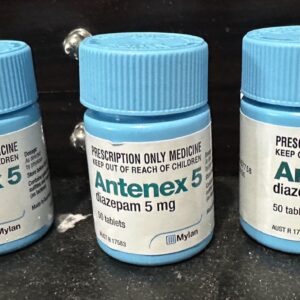Valium (Diazepam) 10 mg: A Comprehensive Guide
Introduction
valium 10mg diazepam, the brand name for diazepam, is a medication commonly prescribed for its sedative, anxiolytic, muscle relaxant, and anticonvulsant properties. The 10 mg dosage of Valium is particularly popular among healthcare providers for treating various conditions, including anxiety disorders, panic attacks, muscle spasms, and seizures. In this article, we will explore the uses, benefits, side effects, and important considerations associated with Valium 10 mg https://pillsogbars.com/product/valium-10mg-diazepam
What is Diazepam?
Diazepam is a benzodiazepine, a class of medications that enhance the effects of a neurotransmitter called gamma-aminobutyric acid (GABA) in the brain. GABA is responsible for inhibiting nerve transmission in the brain, leading to a calming effect. valium 10mg diazepam is often prescribed for both short-term and long-term management of anxiety and related disorders.
Key Benefits of Valium 10 mg
1. Effective Anxiety Relief
One of the primary uses of Valium is to alleviate symptoms of anxiety. It works quickly to reduce feelings of tension, nervousness, and fear, making it an effective option for individuals experiencing acute anxiety or panic attacks. Many patients report significant improvement in their mood and overall sense of well-being after taking Valium.
2. Muscle Relaxation
Valium 10mg diazepam is also effective in treating muscle spasms and spasticity. It relaxes tight muscles, providing relief for conditions such as back pain, neck pain, or muscle injuries. This muscle relaxant property makes it a popular choice for those recovering from physical trauma or surgery.
3. Seizure Management
Diazepam is used in the management of seizure disorders, particularly in emergency situations where rapid control is necessary. It can be administered intravenously in a hospital setting to quickly stabilize patients experiencing severe seizures.
4. Sleep Aid
Due to its calming effects, Valium may be prescribed to help individuals with sleep disorders. It can assist in reducing anxiety-related sleep disturbances, promoting a more restful night’s sleep.
Dosage and Administration
- Recommended Dosage: The typical starting dose for anxiety is 2 mg to 10 mg taken two to four times a day, depending on the severity of symptoms. For muscle spasms, a similar dosing schedule is often followed.
- Administration: Valium 10mg diazepam can be taken with or without food. It is important to follow your healthcare provider’s instructions regarding dosage and frequency to minimize the risk of dependency.
Side Effects
While many individuals tolerate Valium well, it may cause side effects in some users. Common side effects include:
- Drowsiness
- Fatigue
- Dizziness
- Dry mouth
- Blurred vision
In rare cases, more severe side effects may occur, including allergic reactions or respiratory depression. If you experience any troubling symptoms, contact your healthcare provider immediately.
Precautions and Warnings
Before using Valium 10mg diazepam, it’s essential to inform your doctor about any existing medical conditions, especially:
- History of Substance Abuse: Valium has the potential for addiction and should be used with caution in individuals with a history of substance abuse.
- Respiratory Issues: Those with chronic obstructive pulmonary disease (COPD) or sleep apnea may be at increased risk of respiratory depression while taking Valium.
- Pregnancy and Breastfeeding: Valium is not recommended during pregnancy due to potential risks to the fetus and should be used cautiously in breastfeeding mothers.
Conclusion
Valium Diazepam 10 mg is a versatile medication that effectively manages anxiety, muscle spasms, and seizures. With its rapid onset of action and multiple therapeutic uses, it remains a valuable option for healthcare providers. However, it is crucial to use Valium responsibly, adhering to prescribed dosages and being aware of potential side effects.
If you believe Valium may be suitable for your condition, consult your healthcare provider for a thorough evaluation and discussion of your treatment options. Understanding the benefits and risks associated with Valium will help you make informed decisions about your health.
FAQs
1. Is Valium addictive?
Yes, Valium has the potential for addiction, particularly with long-term use. It is essential to follow your doctor’s recommendations closely.
2. Can I drive after taking Valium?
Valium may cause drowsiness and impair your ability to drive or operate machinery. It’s best to avoid these activities until you know how the medication affects you.
3. How should Valium be stored?
Store Valium at room temperature, away from moisture and heat, and out of reach of children.
For more information about Valium and its uses, consult reputable sources such as the National Institutes of Health.




